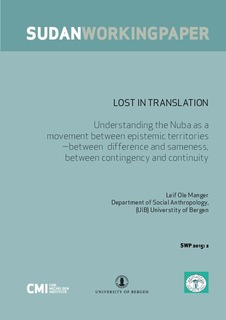Lost in Translation. Understanding the Nuba as a Movement Between Epistemic Territories – between difference and sameness, between contingency and continuity
Original version
Bergen: Chr. Michelsen Institute (Sudan Working Paper no. SWP 2015:2) 36 p.Abstract
The paper is a broad discussion focusing on the Nuba people of the Sudan. The starting point for the reflections is the issue of “translation” in which the author argues for a continued focus on epistemological work to understand more of a Nuba “reality”. This point is made in opposition to arguments within the so-called “ontological turn” in anthropology, in which the “Nuba” and their “Arab” and “Muslim” neighbors would represent different ontological realities, realities that cannot meet. Two major points are made and developed in the paper. First, by discussing three entry points for understanding Nuba history, society and culture the paper shows how the understanding of the Nuba is not limited by a single ontology, but rather evolves in a communication between concepts, questions asked, and attempts at providing answers. The three points are the Nuba as seen through the lens of ethnicity, the Nuba as seen through historical suffering, and the Nuba seen as borderland population. Taken together the Nuba emerge from these discussions as many different things, not to be reduced to a single, pre-given and reified ontology. The second move in the paper is to argue that there is a need for further political debates about the position of the Nuba in a Sudanese nation state, a debate a radical ontological position would also stifle, given the argument that different ontologies cannot meet. Based on the earlier discussion showing complexity and dynamism among the Nuba, the paper makes a strong argument for dialogue among Sudanese people as a basis for co-existence. Again, facts don’t speak for themselves. The need for political interaction is linked to a discussion of positions within political philosophy represented by Rawls, Habermas and Sen. The practical use of the discussion on theoretical possibilities is illustrated with two examples from the ongoing debates in the Sudan, on land a
